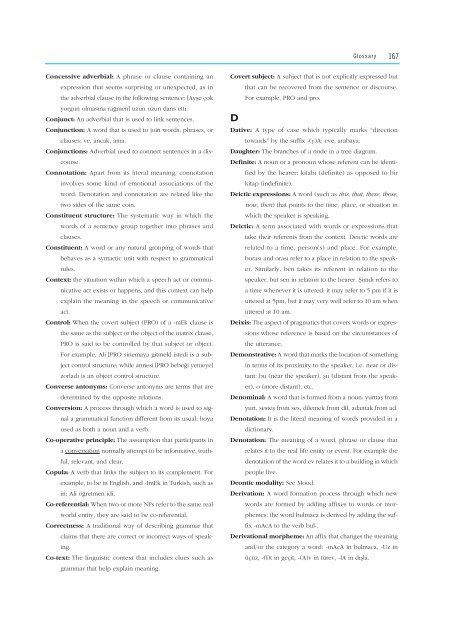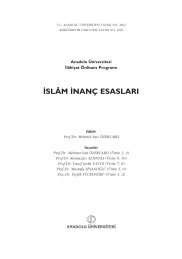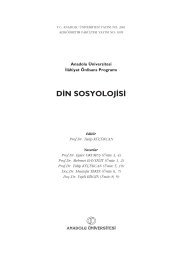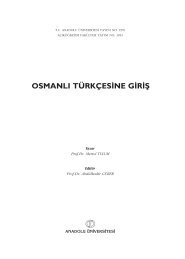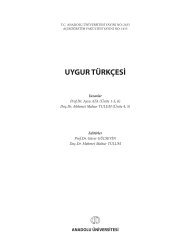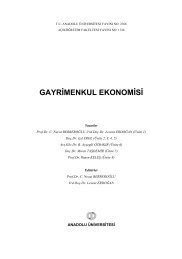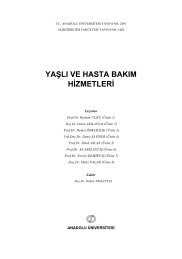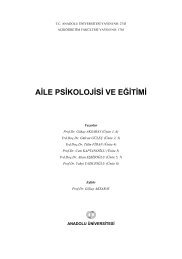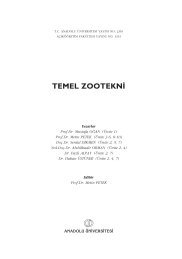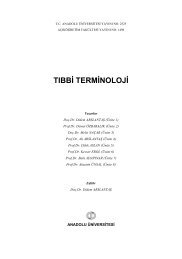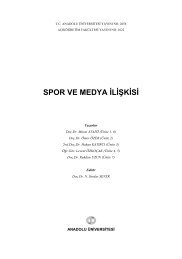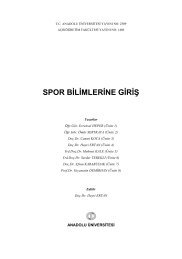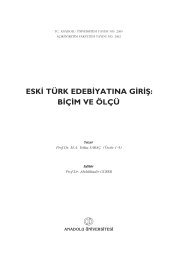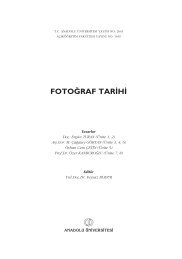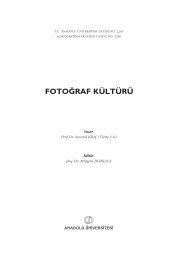turkish phonology and morphology (türkçe ses ve b‹ç‹mb‹lg‹s‹)
turkish phonology and morphology (türkçe ses ve b‹ç‹mb‹lg‹s‹)
turkish phonology and morphology (türkçe ses ve b‹ç‹mb‹lg‹s‹)
You also want an ePaper? Increase the reach of your titles
YUMPU automatically turns print PDFs into web optimized ePapers that Google loves.
Concessi<strong>ve</strong> ad<strong>ve</strong>rbial: A phrase or clause containing an<br />
expression that seems surprising or unexpected, as in<br />
the ad<strong>ve</strong>rbial clause in the following sentence: [Ayfle çok<br />
yorgun olmas›na ra¤men] uzun uzun dans etti.<br />
Conjunct: An ad<strong>ve</strong>rbial that is used to link sentences.<br />
Conjunction: A word that is used to join words, phra<strong>ses</strong>, or<br />
clau<strong>ses</strong>: <strong>ve</strong>, ancak, ama.<br />
Conjunctions: Ad<strong>ve</strong>rbial used to connect sentences in a discourse.<br />
Connotation: Apart from its literal meaning, connotation<br />
invol<strong>ve</strong>s some kind of emotional associations of the<br />
word. Denotation <strong>and</strong> connotation are related like the<br />
two sides of the same coin.<br />
Constituent structure: The systematic way in which the<br />
words of a sentence group together into phra<strong>ses</strong> <strong>and</strong><br />
clau<strong>ses</strong>.<br />
Constituent: A word or any natural grouping of words that<br />
beha<strong>ve</strong>s as a syntactic unit with respect to grammatical<br />
rules.<br />
Context: the situation within which a speech act or communicati<strong>ve</strong><br />
act exists or happens, <strong>and</strong> this context can help<br />
explain the meaning in the speech or communicati<strong>ve</strong><br />
act.<br />
Control: When the co<strong>ve</strong>rt subject (PRO) of a -mEk clause is<br />
the same as the subject or the object of the matrix clause,<br />
PRO is said to be controlled by that subject or object.<br />
For example, Ali [PRO sinemaya gitmek] istedi is a subject<br />
control structure; while annesi [PRO bebe¤i yemeye]<br />
zorlad› is an object control structure.<br />
Con<strong>ve</strong>rse antonyms: Con<strong>ve</strong>rse antonyms are terms that are<br />
determined by the opposite relations.<br />
Con<strong>ve</strong>rsion: A process through which a word is used to signal<br />
a grammatical function different from its usual: boya<br />
used as both a noun <strong>and</strong> a <strong>ve</strong>rb.<br />
Co-operati<strong>ve</strong> principle: The assumption that participants in<br />
a con<strong>ve</strong>rsation normally attempt to be informati<strong>ve</strong>, truthful,<br />
relevant, <strong>and</strong> clear.<br />
Copula: A <strong>ve</strong>rb that links the subject to its complement. For<br />
example, to be in English, <strong>and</strong> -ImEk in Turkish, such as<br />
in: Ali ö¤retmen idi.<br />
Co-referential: When two or more NPs refer to the same real<br />
world entity, they are said to be co-referential.<br />
Correctness: A traditional way of describing grammar that<br />
claims that there are correct or incorrect ways of speaking.<br />
Co-text: The linguistic context that includes clues such as<br />
grammar that help explain meaning.<br />
Glossary<br />
167<br />
Co<strong>ve</strong>rt subject: A subject that is not explicitly expressed but<br />
that can be reco<strong>ve</strong>red from the sentence or discourse.<br />
For example, PRO <strong>and</strong> pro.<br />
D<br />
Dati<strong>ve</strong>: A type of case which typically marks “direction<br />
towards” by the suffix -(y)A: e<strong>ve</strong>, arabaya.<br />
Daughter: The branches of a node in a tree diagram.<br />
Definite: A noun or a pronoun whose referent can be identified<br />
by the hearer: kitab› (definite) as opposed to bir<br />
kitap (indefinite).<br />
Deictic expressions: A word (such as this, that, these, those,<br />
now, then) that points to the time, place, or situation in<br />
which the speaker is speaking.<br />
Deictic: A term associated with words or expressions that<br />
take their referents from the context. Deictic words are<br />
related to a time, person(s) <strong>and</strong> place. For example,<br />
buras› <strong>and</strong> oras› refer to a place in relation to the speaker.<br />
Similarly, ben takes its referent in relation to the<br />
speaker, but sen in relation to the hearer. fiimdi refers to<br />
a time whene<strong>ve</strong>r it is uttered: it may refer to 5 pm if it is<br />
uttered at 5pm, but it may <strong>ve</strong>ry well refer to 10 am when<br />
uttered at 10 am.<br />
Deixis: The aspect of pragmatics that co<strong>ve</strong>rs words or expressions<br />
whose reference is based on the circumstances of<br />
the utterance.<br />
Demonstrati<strong>ve</strong>: A word that marks the location of something<br />
in terms of its proximity to the speaker, i.e. near or distant:<br />
bu (near the speaker), flu (distant from the speaker),<br />
o (more distant), etc.<br />
Denominal: A word that is formed from a noun: yurttafl from<br />
yurt, <strong>ses</strong>tefl from <strong>ses</strong>, dilemek from dil, adamak from ad.<br />
Denotation: It is the literal meaning of words provided in a<br />
dictionary.<br />
Denotation: The meaning of a word, phrase or clause that<br />
relates it to the real life entity or e<strong>ve</strong>nt. For example the<br />
denotation of the word ev relates it to a building in which<br />
people li<strong>ve</strong>.<br />
Deontic modality: See Mood.<br />
Derivation: A word formation process through which new<br />
words are formed by adding affixes to words or morphemes:<br />
the word bulmaca is deri<strong>ve</strong>d by adding the suffix<br />
-mAcA to the <strong>ve</strong>rb bul-.<br />
Derivational morpheme: An affix that changes the meaning<br />
<strong>and</strong>/or the category a word: -mAcA in bulmaca, -Uz in<br />
üçüz, -(I)t in geçit, -(A)v in türev, -lA in d›flla.


